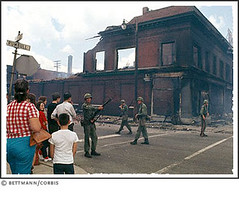
An area around Trumbull Street on Detroit's West Side during the 1967 Rebellion. The Rebellion struck large sections of the city where thousands of National Guard and Army Units were deployed.
Originally uploaded by Pan-African News Wire File Photos
By Karl D. Gregory, Ph. D.
Hearings were held in Detroit on Nov. 17, for updating the recommendations of the Report Of The National Advisory Commission On Civil Disorders, published in 1968 after over 100 uprisings in Black communities across the U.S.
Former Senator Fred Harris of Oklahoma, the chair of the hearings, opened the five hour program with a statement indicating that progress had been made in the first 10 years after the initial release of the Kerner report. However, that progress came to a halt with the Reagan administration. He also cited an array of bleak statistics indicating the large disparities in the relative status of Blacks and whites today. The objective of the hearing was to update the original recommendations of the Kerner Commission in the light of current conditions and to place the discussion of these issues on the national agenda and in the current presidential debate.
Approximately 13 presenters were on the panel. In addition, about 25 persons from the audience of over 200 persons made short statements. The presenters included a professor from Wayne State University’s urban policy and geography staff, representatives from the Mayor’s office, ACORN, the Boggs Center, New Detroit, Inc., Michigan Welfare Rights Organization, the Center For the Education of Women, the League of Women Voters, MOSES, the NAACP, KDG and Associates, the Coordinating Council For Community Development and Brush Park Citizens District Council, plus two elected officials: John Conyers, the Chairperson of the U.S. House Judiciary Committee and George Cushinberry, the chairman of an appropriations committee for the State of Michigan.
The lead-off presenter, Professor George Galster of Wayne State University, spoke of the abundant racism in the Detroit metropolitan area and projected on a large screen a diagram of interactive racial dynamics. The diagram showed how the out-migration of population and disinvestment from Detroit reduced the tax base supporting public and private services there, the quality of schools and other services that were provided, leading to lower performances by some Detroiters, which in turn reinforced views of black “inferiority.” This sequence then confirms the views of some whites who then oppose support for resolving the issues confronting the central city. The interactions were too complex to summarize here appropriately.
The professor lost some of the audience and other panelists, including myself, by his portrayal of “African American Inferiority.” Perhaps because of time constraints, he neglected to distinguish between the purported “inferiority” of Blacks, as contrasted to their lower relative performance as measured by several attributes. Similar looseness of language about “illegal aliens” drives to anger some Hispanics, as well as many non-Hispanics who use language more carefully. No human being can be illegal. Their actions, such as crossing the border without a passport or a visa, as opposed to their very being, is illegal.
The wide variety of backgrounds of panelists provided for an array of viewpoints and perspectives. The representative of the Detroit Mayor and New Detroit, Inc. spoke of several initiatives that were making a positive difference. Nevertheless, virtually all of the panelists who addressed the issue agreed that little progress had been made since 1967 and that the problems existing then still exist. Some are worse.
Several of the participants including this writer were not able to present their full comments. I had about 13 minutes of comments including a lot about racism, but was only permitted to give 7 minutes due to the program running behind schedule. Many enthusiastic persons not on the panel but in the audience wanted to participate more, but time ran out for them also.
These proceedings will appear on the website of the Eisenhower Foundation, the sponsoring agency, in a couple of weeks. The meeting was recorded by a professional legal recorder, several video cameras, including local media and a camera for the staff of Bill Moyers who plans to do a program for PBS. The Detroit Free Press had a short article on the session the following Sunday.
It should be noted that Senator Fred Harris and Lynn A. Curtis published a book in 1998, Locked in the Poorhouse: Cities, Race and Poverty in The United States, on the state of affairs 30 years after the original report of the Kerner Commission. That book contains interesting and relevant articles by social scientists in several pertinent areas. This book deserves wide reading, particularly by persons who will be testifying in the next five cities to have similar hearings. The next city scheduled is Newark, N. J. on Dec. 1. Other cities scheduled include Miami, New Orleans, Los Angeles, and Washington, D.C.
Karl D. Gregory, Ph. D., is Distinguished Professor Emeritus and KDG & Associates, Management & Economic Consulting, 248.569.7387
No comments:
Post a Comment